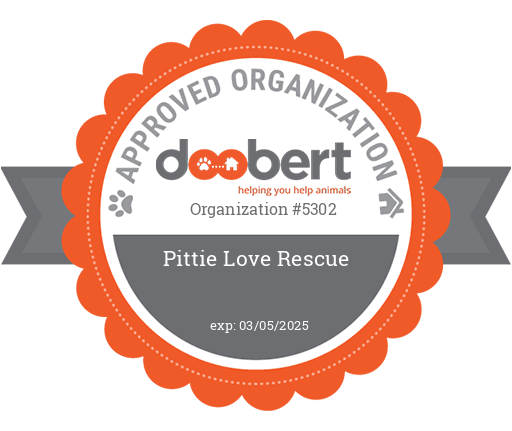Surrendering or Rehoming Your Dog
The decision to give up a dog is difficult and traumatic. We are sincerely sorry if you or someone you care about is in this circumstance.The Reality of Rescue
At PittieLove Rescue, we witness the heart-wrenching reality of abandoned dogs every day. These poor souls, often emaciated and discarded some after being bred multiple times, endure unimaginable suffering. We’ll spare you the gruesome details, but know that the situations we encounter are heartbreaking.
As a volunteer-run rescue without a physical shelter, we rely on foster homes to provide care for the dogs in our program. Unfortunately, due to limited resources, we are typically unable to accept owner surrenders.
Instead, our focus lies on dogs in critical need who are housed in Massachusetts Animal Control facilities and shelters. Sadly, if they are not adopted, euthanasia becomes the only option for many, as there simply isn’t enough room to accommodate them all. The shocking homeless dog population in Massachusetts, and across the nation, demands our immediate attention.
Join PittieLove Rescue in our mission to make a difference. Adopt for Love. Adopt for Life.
Surrender and Rehoming Information
If the dog was adopted from a shelter, rescue or breeder – Please reach out to them first. Most have a policy that requires the dog to be returned back to them in the event you can no longer keep the dog.
If you are considering surrendering your dog to a shelter since most rescues are full and can’t help you, the following is a realistic assessment of what may happen to your dog.
Be Aware That:
- Your dog will be taken into a very stressful environment
- Shelters have hold policies. That means they are obligated by law to hold a dog for a certain number of days before they can be put up for adoption – IF they get put up for adoption at all.
- If they don’t get adopted within a specified amount of time, many shelters are forced to euthanize them to make room for other dogs coming into the shelter
Behavioral Issues
Please see our page on training and how to find a trainer.
If your dog has bitten, you will need to have your dog assessed by a behaviorist that is trained in dog behavior before ever trying to rehome. Most rescues and shelters will not place a dog that has a bite history.
Moving
Guides to moving with a pit bull or other pet:
Renting with a Pitbull-type Dog
Pit-friendly housing:
My Pitbull is Family – Housing Database
Pet Friendly Apartment Listings
Pit Friendly Insurance (contact your agent for up to date info):
State Farm
Farmers Insurance Group
United Services Automobile Association
Dog to Dog Aggression
Dog owners who have dogs that do not get along can benefit from crate and rotation regimens.
Dog aggression toward other dogs is a common trait of pit bulls, and while it often develops between the ages of 18 months and 3 years, it can happen at any time.
Even though many pit bulls get along famously with other dogs, some of them may not.
Some pit bulls become dog aggressive as they mature. The tendency for aggression towards other dogs is heightened between pit bulls of the same sex. In general, pit bulls do best as only dogs in a household or placed in a home with a dog of the opposite sex.
A dog aggressive pit bull requires an experienced owner who is committed to managing the dog and setting her or him up to succeed. Please keep in mind that dog aggression and human aggression (aggression towards people) are two separate behavior traits, one can exist without the other.
If you’re not sure how to maintain a routine, and your dogs are not getting along, talk to a trainer with experience in management of this type and how such an arrangement can be set up for your dogs.






